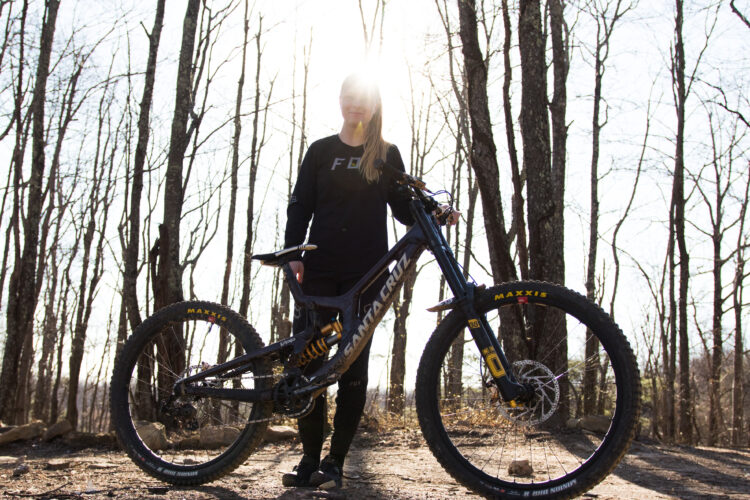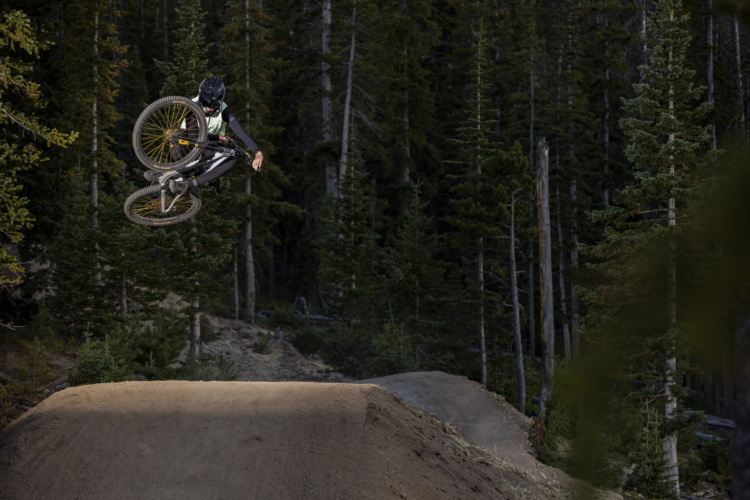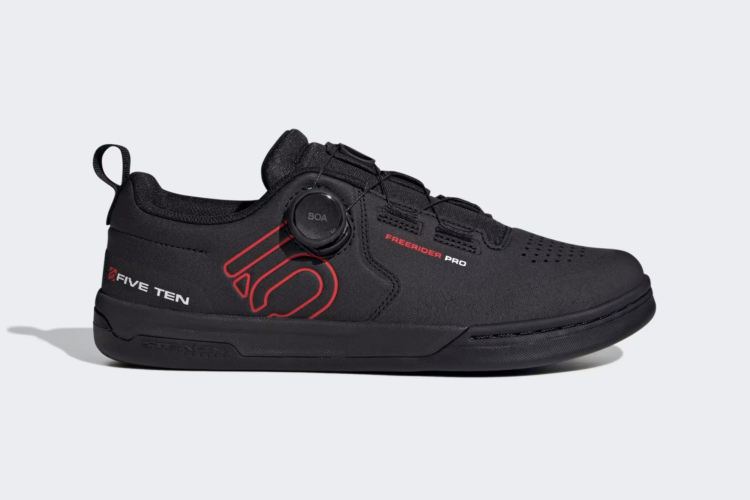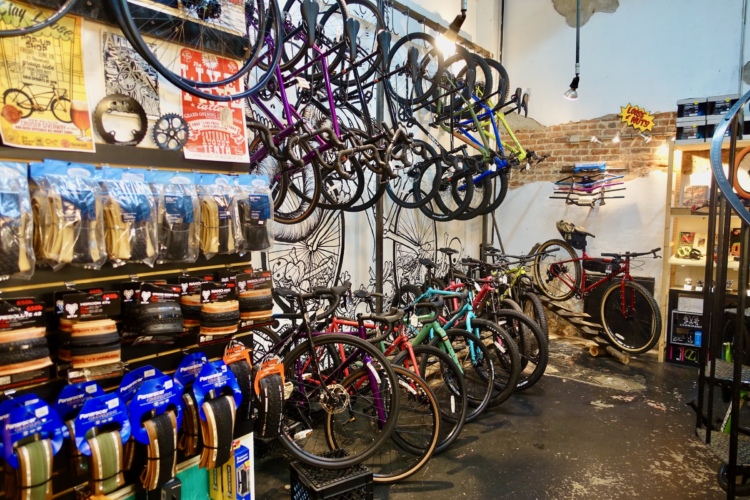
Following in his father’s race motorsport promotion footsteps, YT Mob manager Martin Whiteley has been promoting races and managing teams since before some of his riders were born. The Australian native now resides in Granada, Spain, where he can look after his hand-picked squad of World Cup downhill athletes between his intercontinental tours in search of the next Young Talent.
According to Whiteley’s sports management company website, 23 Degrees Sports, his athletes had won 9 overall world cup titles, 42 World Cup races, stood on 134 World Cup podiums, won 4 Overall World Cup Team Championships, and earned 4 gold medals, 6 silver medals, and 4 bronze medals at World Championship races by the close of the 2018 season. Those are some palmares to be proud of.
We recently spoke with Whiteley, who is now deep in the busiest bit of his World Cup season, getting bikes together and reconfirming all of the hotels and flights that he books a year in advance. Once the races start his role relaxes considerably, and we wanted to share a glimpse of the bustling backside of things.
Whiteley has been organizing races since he was old enough to think logistically. When he was 9 years old he gathered up all of the bikers in his neighborhood to run heats between the regular bikes and the dragsters. At age 21, he Organized Australia’s first mountain bike nationals, and quickly caught the attention of the Australian Cycling Federation. He quickly rose to the CEO position with the federation, where he would go on to run the show for the following ten years. During his tenure as CEO mountain bike racing went through some of its largest growth in history, and great Australian riders like Cadel Evans were displaying their trail talents at the international level.

After a decade with the Aussie Federation, the UCI asked Whiteley to run their MTB program from Switzerland, where, as a technical delegate for the international federation he was able to go to all of the world cup races and see how the whole show was run. During a World Cup week, Whiteley would organize a dinner on Thursday evenings and invite team managers and riders. He wanted to pick their brains and learn how the massive amounts of gear, appointments, and individual schedules were all coordinated. His interest was quickly piqued by the challenging prospect of running a World Cup squad.
Whiteley’s five-year-long career with the UCI culminated with the Sydney Olympics. “Being the technical delegate of my favorite sport, in my home city, it couldn’t get any better than that. So, after the Sydney Olympics, I decided I needed to make a break and try and make a go of this race management thing.” He dove headlong into athlete, event, and team management from there, first working with Cadel Evans before the fellow Australian moved over to road racing.
In 2001, Whiteley’s first year as a full-fledged team manager, a little known athlete on the squad named Greg Minnaar won the World Cup overall title. Martin Whiteley’s ability to spot talent and develop athletes was shining as a beacon over his new career choice.
Skip ahead a load of years, after Whiteley ran the Honda DH team and worked with numerous other athletes, and he now owns and runs the YT Mob World Cup downhill team. YT Mob is a different circus than the other teams Whiteley has worked with, and many of the other teams on the race circuit for that matter. They are a privately-owned organization, which means they own all of their race trucks and tents, and they have to pay for maintenance and upkeep of that costly equipment. It also means that they have to come up with funding every season, whereas factory teams have a bike company behind them that owns everything, and can adjust their budget to accommodate unforeseen costs like broken trailer axles or hospital visits.

According to Whiteley, the key to success for many private teams is to have all of their expenses and cashflow mapped out long before the season is in sight and to create a buffer for emergencies. He mentioned that he learned this lesson quickly when he received his first excess baggage bill that added up to roughly $40,000. Preparing for the season is his full-time job throughout the off season, and it takes every bit of his logistical wizardry to make it happen. As an aside, this speaks volumes to the efforts required from privateer riders who are doing much of that work for themselves, while trying to put together the same perfect race run as the supported riders.
You’re a traveling family. Living with each other, sometimes in a stressful environment. Sometimes there’s a lot on the line, or there’s things that need to get done by a certain time. So, you have to be sure that you can rely not only on your staff but you have a good mix of athletes that get along well. That to me has been fundamental in any team we’ve had. If you look under the microscope you find that the chemistry behind that team is a huge part of its success.
Whiteley mentioned that results are only part of the equation when bringing on a new athlete. They have to understand the character of the team they are signing on to and know what sort of atmosphere to expect throughout the season. Both the athlete and team manager need to agree that the team is a good fit.
So where did YT Industries come into the picture? That was all Aaron Gwin’s doing. Whiteley and Gwin had worked together on a team in the past, and after Gwin took the win from Connor Fearon at the 2015 World Cup race in Leogang without a chain, Whiteley called him up to share his sincere congratulations. The two of them got to talking, and when Gwin received an offer from the German bike brand he immediately asked Whiteley to run the new squad.
Gwin went on to win the first World Cup of the following season in Lourdes, followed by several other UCI podiums and the USA national championship title for 2016. He had found the bike that worked well with his style and the manager who he trusted to sort out all the fine details. All he had left to do was go fast.

We asked Whiteley how the sponsorship selection works for a team like YT Mob, and his response includes a variety of important considerations. “At the end of the day, if the YT bike is getting across the line first, that’s the most important thing.” In other words, the best performing components are the ones that get bolted to the race bikes. He said that it’s also important to consider whether the title sponsor has a relationship with a brand and if the team can showcase the performance of components that will be specked on stock bikes. Finally, each sponsor has to finance some amount of the team budget, though this element is always secondary to their product’s performance characteristics.
From there the rider’s opinions have an effect on component selection, which is where testing comes in. The team needs to test and approve their builds long before the final decisions are made. “The rider has to sit in the start house on race day and feel that he’s done everything, and the bike is completely ready to perform. If he has a niggling doubt about the performance of the bike then it is going to affect his run.”
Sponsors provide nearly 100% of any team’s income stream, and in return, the team provides marketing material, product recognition and visibility, and the best performance testing money can buy. However there are brands like Mercedes Benz that sponsor the World Cup, and they are leaning entirely on the visibility and image creation side of the payback curve. Whiteley says, “That’s the main reason brands sponsor a team, I think, is to enhance their image and to develop their product. That’s what we offer.”
Running a World Cup team isn’t always a lucrative venture, as Whiteley recalls that “in the seven years of my Trek team there were two years I made a loss, two years I broke even, and three I didn’t.” This less stable nature of the team’s income is precisely why his business also works with athlete and event management, in addition to the team. With a few irons in the fire, everything runs smoother.
It can’t all be wine and roses in the World Cup race scene. Whiteley said that the hardest part of his job is when he has to let an athlete know that they don’t have a job anymore. He works hard to build the family-like environment with his squad, and breaking that up is not something he takes lightly.
“Every time they hit the track they’re putting their wellness on the line. It’s not an easy sport, and you can have a crash that can possibly change your life. […] You have to recognize they’re not just doing that for themselves, they’re doing it for you and for your sponsors.”
Finally, Whiteley shared a bit of what the finances look like for many World Cup teams. He said that it costs roughly $20,000 to feed, house, and transport a rider through the season, not including their salary. Most major World Cup MTB teams are lucky if they can scrape together a million-dollar annual budget. The team can pay an athlete whatever they want, as these squads are not publically traded, and there are no shareholders to consult. They simply have to approve salaries with the main title sponsors.
According to Whiteley, there is a large pay difference between race winners and folks who rarely crack the top 20. “If you’re a regular race winner, you’re earning a six-figure salary.”
That would explain why most teams only hire one star rider who mentors a handful of lower-ranked or junior teammates. Compare that to winning Tour de France road racers who earn in the millions, and have their faces on billboards all across Europe. The pay discrepancy between World Cup riders is notably less than the divide between cyclists of different disciplines.

We’d like to thank Martin Whiteley for taking the time to give a us peek behind the team tent walls. Follow along with Whiteley and the YT Mob on their social channels, or on the live World Cup race feed at Redbull.com.



















0 Comments